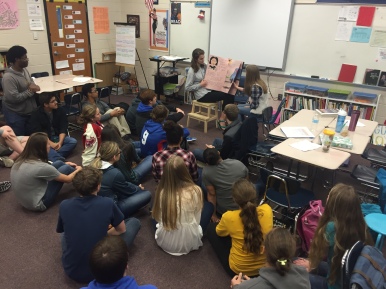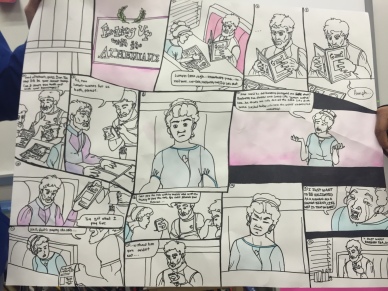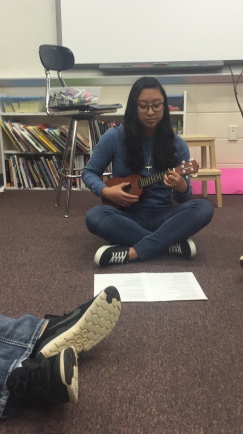 I took a hiatus from my blog during January to work on my dissertation. My chair told me I needed to have a complete draft by the end of January to graduate in May. I didn’t make the deadline. (I am now shooting for completion by April to graduate in July.)
I took a hiatus from my blog during January to work on my dissertation. My chair told me I needed to have a complete draft by the end of January to graduate in May. I didn’t make the deadline. (I am now shooting for completion by April to graduate in July.)
This is the season for college applications, which means the season of writing lots of recommendations and editing lots of admission essays. A question I see that keeps popping up for college applicants as well as job applicants—in some manner or another—is name a time you’ve failed and how you overcame.
In my English 10 classes, we are working on our Shakespeare themed units. I wanted to do something different with this unit, and I wanted to provide choice. I planned what I thought was a great structure to do that. I would be lying if I said this unit had been a success. There was something lacking in the unit.
Failure has been on my mind.
What do you do when you are a teacher and you feel like you didn’t succeed, or more  bluntly put, failed at a lesson or unit? Reflect, self-assess, make notes and adjustments, learn, and do better.
bluntly put, failed at a lesson or unit? Reflect, self-assess, make notes and adjustments, learn, and do better.
But also, be okay…no be more than okay, be proud that you took a risk, you tried something new, you learned, you grew as an educator (and probably as a person) and your students will benefit from this. Celebrate that!
We have a responsibility to our students, to our profession, and to our future to reflect on our practice. We have a responsibility to make sure that we are reading current research, engaging in proven professional development, and learning from a community of leaders in our field. We have a responsibility to make sure that we are growing as educators and we are putting that into practice so that our students are growing as learners and citizens. But if we are doing that, if we are measuring ourselves by the best education has to offer, if we are stepping out of our comfort zone to do what is right, then we also have a responsibility to let ourselves fail, reflect on our learning from the failure, and go back the next day ready to try (with tweaks) again.
I was quite bummed about my unit. I had been so excited about it, and I was frustrated that it didn’t come to fruition as I had envisioned. I was talking with a colleague about my frustrations with the unit. She asked me why I thought it didn’t go like I had envisioned. I responded with something like, “I don’t know. Something just isn’t right.”
The question haunted me. I needed to really reflect: What was it that specifically that went wrong? What was I not happy with? Why did it not go like I wanted? How could it have gone different? AND what did go right?
I realized timing was a bit of an issue with this unit. Since timing became an issue, I didn’t focus as much on reading and writing skills to make up for loss of time. Choice was another issue. Although I didn’t dictate how students wrote in this unit, I felt I forced them into the box of one particular lens for too long. I should have started with the teacher-directed lens and then let them explore others on their own.
Now that I named the failure, I know what to do differently, what to do better next unit.
But I also had to think about what went right. Students’ final tasks as well as their online discussion about the texts showed a real sense of understanding—way beyond the surface level. Students weren’t just reading a Shakespeare play because we always teach a Shakespeare play. They had purpose and direction. Students were able to discuss themes across texts—they talked about the impact of the theme of deception not only in the play they studied for this unit, but also in their independent novels, informational texts, and other Shak espearean plays.
espearean plays.
[Side note: One thing I did make sure we did was have 10 minutes of class reading time for independent novels three to four and sometimes five days a week. After I commented on how I loved seeing a particular student with two books in hand, she said, “It’s because of you. You made us read, and now I can’t stop.” That’s a success.]
Mary Ehrenworth once said something to the effect of it is worse to keep teaching as we’ve always taught than to try to do right by students and not be perfect. I was far from perfect in this unit, but I know I tried to do right by my kids, and in doing so, the failure unit helped my kids grow more as readers and writers than by not doing anything different.
If you want to see some of the end results from this unit, look at these examples and this student created music video. The final project (which accompanied a paper, a online Socratic discussion, and reading journals) was a creative piece on how a character they studied viewed deception presented from the character’s point of view. This part of the unit was successful. Many of them also discussed other themes in their interpretation.
Bonus Read: Pernille Rip seems to continually challenge me with her thoughtful posts. And she always seems to know what I’ve been discussing with my colleagues. I love her openness to conversation about hot topics and her fearlessness in tackling them head-on. If you have found yourself in a discussion on whole class novels, I suggest you read her post, “So You Teach a Whole Class Novel – A Small Idea to Help.”

